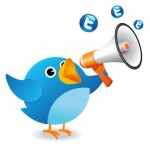 I’ve been thinking a bit about Twitter lately, and just how useful it is as a tool or platform. The pondering was prompted by a discussion I had with the author of a new report into social media best practice in the National Health Service.
I’ve been thinking a bit about Twitter lately, and just how useful it is as a tool or platform. The pondering was prompted by a discussion I had with the author of a new report into social media best practice in the National Health Service.
The report focused primarily on Twitter and how hospitals and professionals can use the platform as part of their work. No mention was made of social tools such as telehealth or MOOCs, or any of the other social approaches to work that I believe are so valuable.
It got me thinking. I posted a while back about research showing how often we share things without reading them and I was reminded of this as I spoke to the author of the report.
I sometimes get articles shared by some senior figures in the NHS, and they tend to get a lot of retweets and so on, and yet looking at my analytics, I don’t think I’ve ever had more visits from those tweets than the number of retweets that senior figure had.
To put that into perspective, the collective following of the original sharer plus those who retweet must be close to 100,000, and yet this activity tends to generate just a (relative) trickle of traffic.
Now of course, it’s good for the ego, which will be a persistent thread here, but perhaps not so good for traffic, and one suspects for the learning of those who share either (seeing as they don’t seem to actually read what’s shared!).
Fake accounts
And then you have the rise in astroturfing, or the buying of fake accounts in other words. I’ve written a few times about the growth in this black market, but it was brought back to light in the wake of the recent Scottish referendum, after which both Nicola Sturgeon and Alex Salmon gained around 100,000 new followers very quickly.
Of course, the vast majority of them are fake, as the newspapers quickly revealed. Whether the accounts are sock puppets that are using Salmond to appear more authentic or the politicians have followed Mitt Romney in trying to appear more popular online, it’s hard to really say.
It all kind of underlines the seeming vanity of the network however. Lots of people may follow you or share what you post, but what difference does it really make?
A study published by Pew recently looked at the most valuable IT tools in the workplace, and traditional workhorses like email thrashed social networks by a huge margin. Yet you’ll have a hard job finding someone espousing the virtues of email over Twitter on the web.
If you search via the Adwords keyword tool, you’ll see that something like 40,000 searches a month are done for ‘buy Twitter followers’.
Now don’t get me wrong, I actually quite like Twitter, but in terms of its place in the list of game changing things, I’d say it’s quite small. Sure, it lets you talk easily to a wide range of people, and it can be a source of interesting content, but in the grand scheme of things, those are all relatively minor, especially for people whose job is not in that field.
It begs the question, will Twitter ever rise above the tiny proportion of employees who find it valuable to their work?
It's great if you want your ego massaging but that's about it. Maybe I'm not using it properly or something.
Besides customer support, PR, and service announcements (network down, airlines, weather, news etc…) it's indeed hard to see the benefits from a publishing standpoint. At least that's been my experience.
I agree with this. I think there's a whole lot of image goes on on Twitter without much substance.
If you work in the trade then I'm sure it has some value. If you don't though I'd say limited. I mean those tweet chats ffs, how much can you really learn from 140 character soundbites?
I'm a big shot because I have lots of Twitter followers. Or something.
I think it really depends on the business model. Out of curiosity, I just checked traffic on my blog on Google Analytics for the year 2014. 25% of all the traffic came from referral, which aligns with other stats I have seen out there, 30-32% according to TechCrunch, I believe. Facebook was my #1 referral, followed by Twitter and then some other sites where I collaborate, then Linkedin and so on. Thus, Twitter indeed serves its purpose, sending traffic to my site. This begs the question: how are brands using Twitter?
I am also seeing quite a few new features being introduced lately by Twitter, from native video to group messaging to filtered newsfeed… I think Twitter still has a few surprises up its sleeve, and needs to counter-attack while Instagram, Facebook and others are pushing forward with their new features as well.
What I really wonder is if the rumors are true: will Google acquire Twitter in 2015?